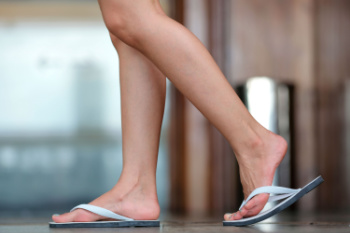
Flip-flops, while convenient and casual, are not ideal for foot health. Their lack of arch support and cushioning can lead to issues like foot pain, poor posture, and increased risk of injury. The minimal support may worsen conditions like plantar fasciitis and contribute to misalignment of the feet. Flip-flops also offer little protection from sharp objects or uneven surfaces, making them unsuitable for extended walking or physical activities. They are best worn for brief periods in low-risk environments, such as the poolside or beach, where minimal foot protection is needed. For daily wear or activities that involve prolonged standing or walking, opt for footwear that provides proper arch support and cushioning to promote overall foot health and comfort. Foot conditions may develop when flip flops are frequently worn. If this applies to you, it is suggested that you consult a podiatrist for treatment and who can guide you toward more appropriate shoe choices.
Flip-flops can cause a lot of problems for your feet. If you have any concerns about your feet or ankles, contact Michael Tomey, DPM from Cary Foot & Ankle Specialists. Our doctor will assist you with all of your foot and ankle needs.
Flip-Flops and Feet
Flip-flops have managed to become a summer essential for a lot of people. While the shoes may be stylish and easy to slip on and off, they can be dangerous to those who wear them too often. These shoes might protect you from fungal infections such as athlete’s foot, but they can also give you foot pain and sprained ankles if you trip while wearing them.
When Are They Okay to Wear?
Flip-flops should only be worn for very short periods of time. They can help protect your feet in places that are crawling with fungi, such as gym locker rooms. Athlete’s foot and plantar warts are two common fungi that flip-flops may help protect your feet against.
Why Are They Bad for My Feet?
These shoes do not offer any arch support, so they are not ideal for everyday use. They also do not provide shock absorption or heel cushioning which can be problematic for your feet. Additionally, you may suffer from glass cuts, puncture wounds, and stubbed toes since they offer little protection for your feet.
More Reasons Why They Are Bad for Your Feet
- They Slow You Down
- May Cause Blisters and Calluses
- Expose Your Feet to Bacteria
If you have any questions, please feel free to contact our office located in Cary, NC . We offer the newest diagnostic and treatment technologies for all your foot care needs.
